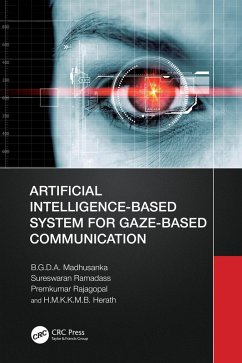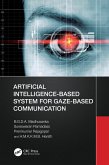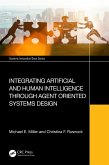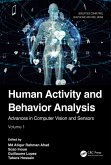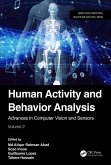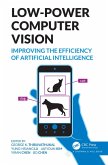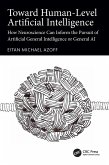B. G. D. A. Madhusanka, Sureswaran Ramadass, Premkumar Rajagopal, H. M. K. K. M. B. Herath
Artificial Intelligence-Based System for Gaze-Based Communication (eBook, ePUB)
52,95 €
52,95 €
inkl. MwSt.
Sofort per Download lieferbar

26 °P sammeln
52,95 €
Als Download kaufen

52,95 €
inkl. MwSt.
Sofort per Download lieferbar

26 °P sammeln
Jetzt verschenken
Alle Infos zum eBook verschenken
52,95 €
inkl. MwSt.
Sofort per Download lieferbar
Alle Infos zum eBook verschenken

26 °P sammeln
B. G. D. A. Madhusanka, Sureswaran Ramadass, Premkumar Rajagopal, H. M. K. K. M. B. Herath
Artificial Intelligence-Based System for Gaze-Based Communication (eBook, ePUB)
- Format: ePub
- Merkliste
- Auf die Merkliste
- Bewerten Bewerten
- Teilen
- Produkt teilen
- Produkterinnerung
- Produkterinnerung

Bitte loggen Sie sich zunächst in Ihr Kundenkonto ein oder registrieren Sie sich bei
bücher.de, um das eBook-Abo tolino select nutzen zu können.
Hier können Sie sich einloggen
Hier können Sie sich einloggen
Sie sind bereits eingeloggt. Klicken Sie auf 2. tolino select Abo, um fortzufahren.

Bitte loggen Sie sich zunächst in Ihr Kundenkonto ein oder registrieren Sie sich bei bücher.de, um das eBook-Abo tolino select nutzen zu können.
This book focuses on the artificial nueral network-based system for gaze-based communication. It covers the practical collaboration of HCI in which a user can express tasks using gaze-based communication. It will target the applications of gaze-based communication using computer vision, image processing, and AI.
- Geräte: eReader
- mit Kopierschutz
- eBook Hilfe
Andere Kunden interessierten sich auch für
![Artificial Intelligence-Based System for Gaze-Based Communication (eBook, PDF) Artificial Intelligence-Based System for Gaze-Based Communication (eBook, PDF)]() B. G. D. A. MadhusankaArtificial Intelligence-Based System for Gaze-Based Communication (eBook, PDF)52,95 €
B. G. D. A. MadhusankaArtificial Intelligence-Based System for Gaze-Based Communication (eBook, PDF)52,95 €![Integrating Artificial and Human Intelligence through Agent Oriented Systems Design (eBook, ePUB) Integrating Artificial and Human Intelligence through Agent Oriented Systems Design (eBook, ePUB)]() Michael E. MillerIntegrating Artificial and Human Intelligence through Agent Oriented Systems Design (eBook, ePUB)45,95 €
Michael E. MillerIntegrating Artificial and Human Intelligence through Agent Oriented Systems Design (eBook, ePUB)45,95 €![Human Activity and Behavior Analysis (eBook, ePUB) Human Activity and Behavior Analysis (eBook, ePUB)]() Human Activity and Behavior Analysis (eBook, ePUB)52,95 €
Human Activity and Behavior Analysis (eBook, ePUB)52,95 €![Human Activity and Behavior Analysis (eBook, ePUB) Human Activity and Behavior Analysis (eBook, ePUB)]() Human Activity and Behavior Analysis (eBook, ePUB)52,95 €
Human Activity and Behavior Analysis (eBook, ePUB)52,95 €![Low-Power Computer Vision (eBook, ePUB) Low-Power Computer Vision (eBook, ePUB)]() Low-Power Computer Vision (eBook, ePUB)47,95 €
Low-Power Computer Vision (eBook, ePUB)47,95 €![Toward Human-Level Artificial Intelligence (eBook, ePUB) Toward Human-Level Artificial Intelligence (eBook, ePUB)]() Eitan Michael AzoffToward Human-Level Artificial Intelligence (eBook, ePUB)48,95 €
Eitan Michael AzoffToward Human-Level Artificial Intelligence (eBook, ePUB)48,95 €![Exploratory Data Analytics for Healthcare (eBook, ePUB) Exploratory Data Analytics for Healthcare (eBook, ePUB)]() Exploratory Data Analytics for Healthcare (eBook, ePUB)51,95 €
Exploratory Data Analytics for Healthcare (eBook, ePUB)51,95 €-
-
-
This book focuses on the artificial nueral network-based system for gaze-based communication. It covers the practical collaboration of HCI in which a user can express tasks using gaze-based communication. It will target the applications of gaze-based communication using computer vision, image processing, and AI.
Dieser Download kann aus rechtlichen Gründen nur mit Rechnungsadresse in A, B, BG, CY, CZ, D, DK, EW, E, FIN, F, GR, HR, H, IRL, I, LT, L, LR, M, NL, PL, P, R, S, SLO, SK ausgeliefert werden.
Produktdetails
- Produktdetails
- Verlag: Taylor & Francis eBooks
- Seitenzahl: 216
- Erscheinungstermin: 3. Mai 2024
- Englisch
- ISBN-13: 9781040006252
- Artikelnr.: 70411085
- Verlag: Taylor & Francis eBooks
- Seitenzahl: 216
- Erscheinungstermin: 3. Mai 2024
- Englisch
- ISBN-13: 9781040006252
- Artikelnr.: 70411085
- Herstellerkennzeichnung Die Herstellerinformationen sind derzeit nicht verfügbar.
Dr. B.G.D.A. Madhusanka received his B.Tech (Honours) from the Open University of Sri Lanka in 2010, followed by a Master's in Industrial Automation from the University of Moratuwa in 2017. In 2022 he graduated with his PhD in Informatics from the Malaysia University of Science and Technology (MUST). His research direction focus on image processing, service robotics, artificial intelligence, gesture recognition, activities of daily living, and automation. Professor Sureswaran Ramadass is a Professor at the Malaysian University of Science and Technology (MUST). He is also the Chief Scientist at Crystalviewhd Sdn Bhd (formerly known as NLTVC Sdn Bhd), Crystalviewhd is a Next Generation Internet Communications research and development company and the Managing Director of VHGlobal Sdn Bhd. VHGlobal is an advanced patient-centric global telehealth platform. Before this, he was the founding Director and Professor at the National Advanced IPv6 Centre of Excellence (NAV6), Universiti Sains Malaysia. He obtained his BsEE/CE (Magna Cum Laude) and Masters in Electrical and Computer Engineering from the University of Miami in 1987 and 1990. He graduated top student in the College of Engineering. He obtained his PhD from Universiti Sains Malaysia (USM) in 2000 while serving as a full-time faculty in the School of Computer Sciences.
Professor Dr Premkumar Rajagopal received his BBA from RMIT University in Melbourne in the year 1996, followed up by an MBA in Universiti Utara Malaysia in 1998. In 2006, he graduated with his PhD in Management from Universiti Sains Malaysia 2006. The current President of Malaysia University of Science and Technology, Prof. Dr. Premkumar is a detail-oriented University President with 14 years of experience in the Education Industry. He is an experienced Logistics and Supply Chain Manager with over 12 years of experience in the electronic industry (INTEL TECHNOLOGY). His professional experience has also earned him the recognition from International Supply Chain Education Alliance (ISCEA), as he was appointed as the President of the ISCEA Malaysia in 2020. Eng.
H.M.K.K.M.B. Herath is a Lecturer in the School of Computing and IT, at the Sri Lanka Technological Campus (SLTC). He teaches course modules in Robotics Engineering, Autonomous Systems, and Embedded System Development. In 2019, Herath received Bachelor of Technology Honours in Mechatronics Engineering at The Open University of Sri Lanka. In 2016, he also graduated from the National Institute of Business Management. He holds professional membership at The Institution of Engineers Sri Lanka (IESL), Engineering Council Sri Lanka (ECSL), and the Institute of Electrical and Electronics Engineers (IEEE). His research interests are in the fields of Biomedical Engineering, Brain-Computer Interfacing (BCI), the Internet of Things (IoT), Human-Computer Interaction (HCI), Artificial Intelligence (AI), and Computational Intelligence.
Professor Dr Premkumar Rajagopal received his BBA from RMIT University in Melbourne in the year 1996, followed up by an MBA in Universiti Utara Malaysia in 1998. In 2006, he graduated with his PhD in Management from Universiti Sains Malaysia 2006. The current President of Malaysia University of Science and Technology, Prof. Dr. Premkumar is a detail-oriented University President with 14 years of experience in the Education Industry. He is an experienced Logistics and Supply Chain Manager with over 12 years of experience in the electronic industry (INTEL TECHNOLOGY). His professional experience has also earned him the recognition from International Supply Chain Education Alliance (ISCEA), as he was appointed as the President of the ISCEA Malaysia in 2020. Eng.
H.M.K.K.M.B. Herath is a Lecturer in the School of Computing and IT, at the Sri Lanka Technological Campus (SLTC). He teaches course modules in Robotics Engineering, Autonomous Systems, and Embedded System Development. In 2019, Herath received Bachelor of Technology Honours in Mechatronics Engineering at The Open University of Sri Lanka. In 2016, he also graduated from the National Institute of Business Management. He holds professional membership at The Institution of Engineers Sri Lanka (IESL), Engineering Council Sri Lanka (ECSL), and the Institute of Electrical and Electronics Engineers (IEEE). His research interests are in the fields of Biomedical Engineering, Brain-Computer Interfacing (BCI), the Internet of Things (IoT), Human-Computer Interaction (HCI), Artificial Intelligence (AI), and Computational Intelligence.
1. Introduction to Gaze-based Communication. 2. Assistive Technologies to
Implicit Intention Communication Through Visual Behaviour for Daily Living
Activities. 3. An Integrated System for Improved Implicit Intention
Communication for Older People on Daily Living Activities. 4. The
Artificial Neural Network Approached Gaze-based Implicit Intention
Communication. 5. Gaze-based Tracking Applications for the Assisted Living
of Elderly People. 6. The Challenges of Identifying Daily Living Activities
Through Visual Behaviour.
Implicit Intention Communication Through Visual Behaviour for Daily Living
Activities. 3. An Integrated System for Improved Implicit Intention
Communication for Older People on Daily Living Activities. 4. The
Artificial Neural Network Approached Gaze-based Implicit Intention
Communication. 5. Gaze-based Tracking Applications for the Assisted Living
of Elderly People. 6. The Challenges of Identifying Daily Living Activities
Through Visual Behaviour.
1. Introduction to Gaze-based Communication. 2. Assistive Technologies to
Implicit Intention Communication Through Visual Behaviour for Daily Living
Activities. 3. An Integrated System for Improved Implicit Intention
Communication for Older People on Daily Living Activities. 4. The
Artificial Neural Network Approached Gaze-based Implicit Intention
Communication. 5. Gaze-based Tracking Applications for the Assisted Living
of Elderly People. 6. The Challenges of Identifying Daily Living Activities
Through Visual Behaviour.
Implicit Intention Communication Through Visual Behaviour for Daily Living
Activities. 3. An Integrated System for Improved Implicit Intention
Communication for Older People on Daily Living Activities. 4. The
Artificial Neural Network Approached Gaze-based Implicit Intention
Communication. 5. Gaze-based Tracking Applications for the Assisted Living
of Elderly People. 6. The Challenges of Identifying Daily Living Activities
Through Visual Behaviour.
